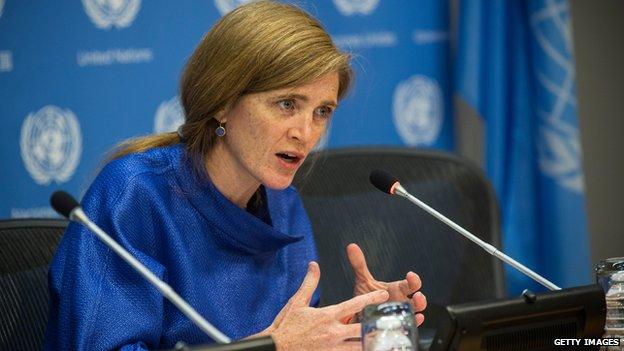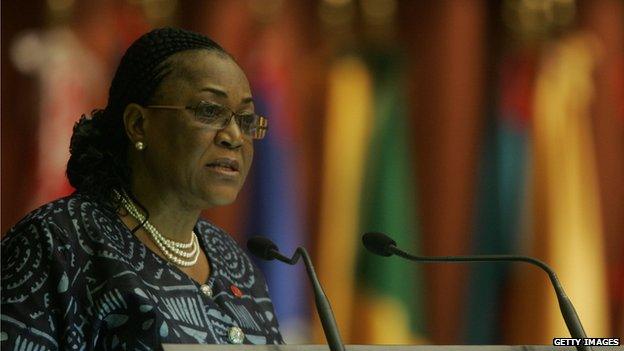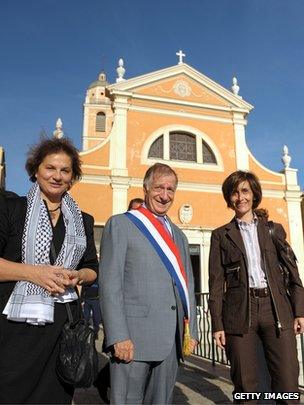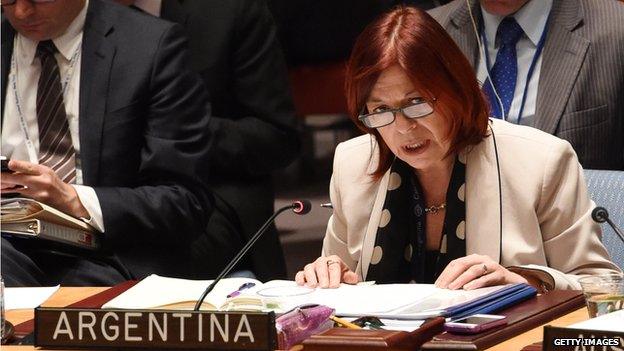At the UN, women play increasingly powerful roles
- Published
Women now make up more than a third of the United Nations Security Council.
Long an all-male enclave, the UN Security Council now has a record number of women. Does that influence how diplomacy gets done at the highest levels?
When Madeleine Albright served as the US permanent representative to the United Nations in New York, she used to speak of the G7. She was not referring to the Group of Seven nations, a rich-countries club of the world's most advanced economies. Rather, she was describing the paltry number of female ambassadors at the UN. Back in the early-1990s, when Albright used to informally bring this group together, two black VIP limousines could have comfortably ferried the entire female ambassadorial corps to the meeting.
Now it would require a fleet. There are 31 female permanent representatives, a record number in the history of the UN. More significantly, women also occupy six seats at the horseshoe table of the Security Council - those belonging to Argentina, Jordan, Lithuania, Luxembourg, Nigeria and the US.
That again is a record-breaking number for the UN's most important decision-making body.

US Ambassador Samantha Power is one of six women with seats on the UN Security Council
Only in recent years have women achieved critical mass on the Security Council. As late as 2010, there were only three women on the council. This year, when the number reached five - a third of the council members - it was seen as a milestone. Now there are six.
So how has the influx of women influenced the character of world diplomacy's top table?
"I think we listen well," says US Permanent Representative Samantha Power, who reckons that attentiveness is the most under-rated ingredient in diplomacy. "I notice that the women tend to take more notes."
Amongst the women on the council, she says, there is "a kind of collegiality, I suppose, or a sisterhood you could call it that is involved, notwithstanding the very different countries that we represent."
Nigeria's ambassador, Joy Ogwu, also looks upon her female colleagues as an "international sisterhood". A former foreign minister of Nigeria, respected on the council for her wisdom, she believes that the feminisation of international diplomacy is a hugely positive development: "Women have greater and deeper and more profound insights into how to resolve problems."

Nigeria's Joy Ogwu sees herself as part of an "international sisterhood" of ambassadors
Jordan's permanent representative, Dina Kawar, the latest women to join the council, believes that female ambassadors adopt a different approach than their male colleagues.
"Women tend to discuss more, to want to find solutions," she says. "Faced with problems, we say: 'Well you know we should do something. This is not proper. We should do something.' There's this desire to find these solutions. I don't know whether it's the mother factor, or what, but there is that aspect that I noticed in the council."
It is not as if women and children were ignored before the influx of female ambassadors on the council, but diplomats say they've become more central to the discussion. In debates about peacekeeping operations around the world, Luxembourg's ambassador, Sylvie Lucas, regularly highlights the need for female participation.

Dina Kawar (right) is the latest female representative on the UN Security Council
When the Security Council met informally with Syrian women to discuss the crisis, Argentina's ambassador, Maria Cristina Perceval, spoke with great passion about the Madres de Plaza de Mayo in her own country - the mothers of disappeared during the period of military rule. Then she gave the Syrian women a white scarf, the symbol of the movement. Would a male Argentine ambassador have thought of such a gesture? Probably not.
All the women on the council stress that they represent their countries, not their gender. "We cannot feminise the national interest," says Joy Ogwu. They can also be just as combative as the men.
Lithuania's ambassador, Raimonda Murmokaite, has been among the fiercest of critics of Russia over its annexation of Crimea and incursions in Ukraine. Samantha Power has landed such heavy rhetorical blows on her Russian counterpart, Vitaly Churkin, that he is regularly knocked off balance.
Male ambassadors on the council are also alert to female issues. Power specifically mentions Britain's permanent representative, Sir Mark Lyall Grant.
"He's one of the leading advocates in the entire UN system on women, peace and security, and violence against women," she says.
Australia's ambassador, Gary Quinlan, has been a key architect of the resolutions passed this year aimed at boosting humanitarian aid into Syria.
For all the recent gains, four out of five of the permanent members of the Security Council have yet to appoint a woman as their senior diplomat in New York. Some had expected that a woman would succeed Sir Grant when his posting ends next April. The Foreign Office in October announced that his successor would be another man, however, the eighteenth in a row.

Argentina Ambassador Maria Cristina Perceval is helping the UN Security Council focus on women's issues
By contrast, four women have represented the US: Jeane Kirkpatrick, Madeleine Albright, Susan Rice and now Samantha Power.
Across the UN, rates of female participation are improving, with women occupying high-profile posts. Valerie Amos, the former British minister, is the organisation's humanitarian chief. Germany's Angela Kane, the UN's high representative for disarmament affairs, helped pave the way for the dismantlement of Syria's chemical weapons arsenal.
Sigrid Kaag, a Dutch diplomat working for the UN, headed up the mission that made sure those weapons were destroyed. Dr Margaret Chan, who has been in the spotlight recently because of the Ebola outbreak, runs the World Health Organisation. In August Maj Gen Kristin Lund became the first female commander of a UN peacekeeping force, taking charge in Cyprus.
Still, men continue to occupy most senior UN posts, including those of secretary general, deputy secretary general, the head of political affairs, the head of the refugee agency UNHCR and the head of peacekeeping. All eight secretaries general have been men. When Ban Ki-moon finishes his term at the end of 2016, the five permanent members of the Security Council, who ultimately decide among the candidates, will come under moral pressure to appoint a woman.
Though it is now possible to talk of a G31, 84% of the ambassadors at the UN are men. There may be more women at the table, but they are still heavily outnumbered.